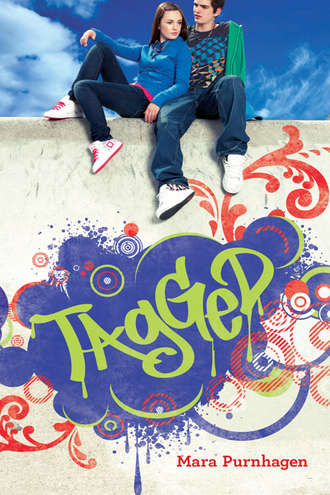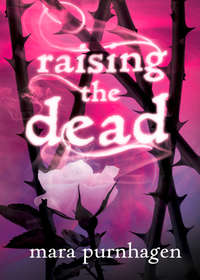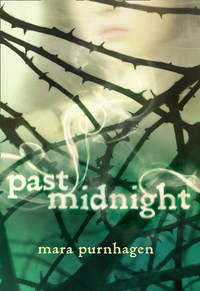
Полная версия
Tagged


There was suddenly a break in the crowd and I could finally get a glimpse of what had everyone so excited. I almost smiled when I saw it. Almost. Then I glanced around for my dad. As soon as he heard about this, he’d be here, sirens wailing. I didn’t see him yet, though, so I turned back to look at the wall. There, painted in thick black against the pale concrete, were half a dozen enormous gorillas.
“Isn’t it amazing? Carter’s going to lose it.”
I agreed that, yes, Principal Carter was definitely going to lose it. This wasn’t your everyday, hastily scribbled graffiti. The gorillas were absolutely lifelike, complete with shadows and stern expressions. They sat staring out at us with huge, watery eyes. Each gorilla was at least four feet tall, and the one in the middle had a thought bubble painted over its head. “So this is what the jungle looks like,” it read.
Tagged
Mara Purnhagen

www.miraink.co.uk
For my parents, who taught me to love books
Acknowledgments
I could offer a thousand thanks to the following people
and it would not be enough, but I’ll try anyway.
Thank you to Robert Lettrick,
“inventor” of the banana latte and diligent reader of first drafts.
Thank you to Kristi Purnhagen,
who offered a critical eye and sound suggestions.
Thank you to all the strong and supportive women in my life, including Barbara Bresock, Mary Ruth Bresock,
Abby Elliot, Barbara Lohrstorfer, Nancy McDaniel,
Sayrah Namaste, Maxine Purnhagen, Christine Sagan,
Jeanne Schaal, Janet Sekerak and Lillian Tupes.
Thank you to Diane Bishop,
my high school English teacher.
Thank you to the entire staff
at the Middle Tyger Library in Duncan, South Carolina.
Thank you to Henry and Quinn,
who inspired me to get serious about all this book stuff.
And finally, thank you to Joe,
who always saw me as a writer.
1
WHEN I GOT OFF THE BUS that crisp January morning and stepped onto the parking lot, the only thing I could see was a crowd of students gathered near the east wall of our school. It looked like some sort of outdoor rock concert, except instead of holding up lighters and swaying to a heavy guitar ballad, people were raising their cell phones to snap pictures and inching forward amid the rumbling.
I had expected the usual zombie-like trance as six hundred sleep-deprived students shuffled silently toward the back doors, carrying their withered backpacks and a deep-seated grudge at being forced to return to the narrow hallways of Cleary High School after two weeks of holiday vacation. But instead of groggy bitterness, everyone seemed filled with a strange, contagious energy. I wondered briefly if the entire student body had descended upon Something’s Brewing and consumed triple-mocha espressos. Nothing else could explain the wide smiles and whooping sounds emanating from the crowd.
I scanned the crowd, searching for my best friend, Lan, but it was nearly impossible with all the people. Everyone seemed to be standing in the same small space, squeezed in between the parked cars and cedar bushes. My cell phone rang and I set my backpack down on the pavement so I could fish it out.
“Kate, where are you?” It was Lan.
“I just got here. I can’t see you.”
“Look toward the back doors.”
I looked over and saw a hand waving from behind a cluster of ball-capped heads. “I’ll be there as soon as I can.”
I slowly made my way through the crowd, which wasn’t easy. No one was moving. They were either talking on their phones or trying to lift each other up to see the east wall. I saw one kid try to climb on top of a car, setting off a piercing alarm.
“This better be good,” I grumbled to myself. Large crowds remind me of cattle, make me feel as if I were just one of the herd. The good part, though, was that you could blend in with everyone else.
“Kate! Over here!”
I finally made it all the way to where Lan was standing. Normally, Lan stood out in any crowd. It wasn’t just that she was the only Vietnamese student at Cleary High School (or in the entire town of Cleary, South Carolina, for that matter) or that she was exceptionally pretty, with long, jet-black hair that she liked to wear in a thick braid that trailed down her back. Lan possessed a sense of style that set her apart from everyone else. Even her name was interesting. It meant orchid in Vietnamese and, to make sure everyone knew it, Lan collected all things orchid, from the delicate jeweled pins she made herself and wore on a regular basis to the live orchids she kept in her room, each one a different color and each one occupying a small ceramic vase.
Lan was exotic without trying to be, unlike me, who was just about as average as humanly possible. Brown hair, brown eyes. Even my name was average. There were times when I wished I possessed a little of Lan’s uniqueness, but I’d learned that it was better not to stand out. I liked to fade into the background and watch people from a distance. Maybe that was why Lan and I were such good friends: we balanced each other out.
I gave her a quick hug. “Good to see you.”
She hugged me back. “It’s been forever,” she agreed.
We hadn’t seen each other since winter break had begun. Lan had been on vacation in Florida with her dad while I had been sprawled out in the den at home watching reality show marathons on TV and consuming way too many carbohydrates. We e-mailed and sent text messages, but I was surprised at how much I had missed my best friend.
I stood on my tiptoes in an attempt to get a view of the wall. “What are we trying to look at?”
She smiled mysteriously. “You’ll see.”
“There’s too many people,” I complained.
There was suddenly a break in the crowd and I could finally get a glimpse of what had everyone so excited. I almost smiled when I saw it. Almost. Then I glanced around for my dad. As soon as he heard about this, he’d be here, sirens wailing. I didn’t see him yet, though, so I turned back to look at the wall. There, painted in thick black against the pale concrete, were half a dozen enormous gorillas.
“Isn’t it amazing? Carter’s going to lose it.”
I agreed that yes, Principal Carter was definitely going to lose it. This wasn’t your everyday, hastily scribbled graffiti. The gorillas were absolutely lifelike, complete with shadows and stern expressions. They sat staring out at us with huge, watery eyes. Each gorilla was at least four feet tall, and the one in the middle had a thought bubble painted over its head. “So this is what the jungle looks like” it read.
“This must have taken hours,” I said. “Who did it?”
It was a stupid question. Everyone already knew.
Lan nodded her head toward the corner. “One guess.”
I could see Trent off to one side, videotaping the crowd and smiling. He was easy to spot because he was the tallest guy at school. Trent Adams, celebrated senior and master of school pranks. He had released twenty chickens in the cafeteria during the first week of his freshman year in protest over the nuggets. As a sophomore he managed to break into the school and move every piece of the principal’s office furniture outside. He rearranged everything just as it had been inside, only now the desk and file cabinets and chairs and plants sat in the middle of the parking lot. That prank made both the local news and school legend. As a junior he decided that he would sing every word that came out of his mouth. There are very few people on this earth who can get away with singing nonstop and still be thought of as cool, but Trent managed to pull it off with ease.
A smaller group of kids had gathered around Trent. Most of them I knew, like Brady Barber and Eli James, who were hard to miss. Not only did they always hang out together, but they always dressed the same, too: baggy black pants, white collared shirt, black hoodie jacket. Reva Abbott was also standing near Trent, wearing tight clothes and a bored expression.
“What I meant to ask was, how did Trent do it?” The mural looked polished and professional. Not the work of an amateur at all. It appeared as if the gorillas had been painted using some kind of laser program—they were that perfect. In fact, it looked like it was the same gorilla copied six times, because they were identical to one another. There was no way it was done freehand, I realized. But there was also no way that Trent had access to the kind of sophisticated equipment I would guess something like this required.
“He’s a genius,” Lan said. “Who knows how he did it?” She stared across the crowd to watch him. Lan had always harbored a secret crush on Trent. Sometimes they flirted, but it had never developed into anything.
I reached into my backpack and pulled out the digital camera my parents had given me for Christmas. It made a sound like tinkling bells when I turned it on. I took as many shots as I could of the wall, knowing that some of the shots would be blocked by people’s heads.
“We might want to get out of here now,” Lan whispered. A police car had pulled into the parking lot. Two officers got out, and kids automatically walked away. One of the officers saw me, smiled and nodded. I nodded back, then let Lan pull me toward the front entrance.
There were still a few minutes before the first bell rang, but we were already in the junior hall, so we didn’t have to hurry. When our new class schedules arrived just before break, Lan and I were thrilled to discover that we had first period history together. We had been best friends since freshman year and had never once had a class together, so this was a cause for celebration. Also, history was my favorite class. Mr. Gildea had a fun teaching style and with his bright brown eyes and wry smile he wasn’t bad to look at, either.
“You’re going to help me out, right?” Lan asked as we slid into desks in the middle of the room. She hated history. I always helped her with term papers and in return she helped me with science labs.
“This is going to be a great class,” I told her. “I had Mr. Gildea last year. He’s awesome.”
“That’s what you said about French, remember?” Lan grumbled.
“I didn’t use the word awesome.”
“No, I think you said it would be très magnifique. Which it was not. And I got a C.”
I dug around in my backpack for a pen, automatically handing one to Lan, who always forgot to bring one to class.
“Oh, great. Look who has decided to grace us with her presence,” Lan whispered. I looked up just as Tiffany Werner sailed into the room talking on her rhinestone-studded cell phone.
“It covers the wall,” she was saying. “I mean, totally and completely. It will never come off, I’m sure. Well, of course. Uh-huh.”
Tiffany Werner was the most spoiled girl I had ever known. She wore “Tiffany-blue,” her signature color, every chance she got. Her parents named her after the famous jewelry store, and she loved to remind people of that fact, which seemed a little odd to me. I mean, if my parents had named me after a store, I wouldn’t be bragging about it, no matter how fancy the store might be. She owned a genuine Tiffany diamond ring, and she considered herself a jewelry expert because of it. She wouldn’t hesitate to lean over and grab someone’s wrist to examine their bracelet or ring or watch, only to laugh and proclaim that it was a fake. She even did it to a teacher once. Tiffany had a way of taking over a classroom and making herself the center of attention, and I hated that.
She took a seat in the front, aware that we were all listening to her conversation. “The police are already here,” she said, and I could feel a few people turn their heads in my direction. I pretended to study my blank notebook. “Trent’s in the office now. They’re questioning him.”
This last comment caused a lot of murmuring in the classroom. The bell rang and Tiffany quickly shut her phone before Mr. Gildea walked into the room. He was one of the few teachers who wouldn’t hesitate to confiscate a phone. Rumor had it that the bottom drawer of his desk was full of them, but I doubted it. Still, no one wanted to take a chance.
“Good morning,” he said as he strode to the lectern. “And how are things in the jungle today?”
We all laughed a little. Mr. Gildea could be funny, probably because he was still young. He always wore khaki pants and a bright tie. This time it was green with thin orange stripes.
“Mr. Gildea, are they going to expel Trent for defacing school property?”
Everyone looked from Tiffany, who had asked the question, to Mr. Gildea, who was examining the attendance sheet.
“One moment, please, Miss Werner.” He looked us over, checked his sheet and then put his pen down.
“Now, then, what was the question?”
Tiffany sighed loudly and repeated herself.
“I have no idea,” he said, “but I’m sure the rumor mill will be up and running with an answer before lunch.”
“They can’t suspend him,” said Brady Barber. He was slouched in a desk at the back of the classroom. “They have no proof.”
“Oh, please,” said Tiffany. “We all know it was him.”
“So what if it was?” Brady was sitting up now. “I’m not saying he did it, but what if he did? It’s art. You can’t suspend people for expressing themselves with art.”
“It’s not art. It’s called defacing public property, and it’s a crime.”
“That wall was already defaced, remember? It was streaked with tar from last year’s roof repairs.”
Tiffany sighed. “That was an accident, Brady. Not vandalism.”
“It was still ugly.”
“So are those gorillas.”
Mr. Gildea held up one hand. “Sounds like we have a difference of opinion,” he said, grinning. He loved a good debate. “You both present a valid point. Where is the line between art and vandalism?”
He went on to say that archaeologists had discovered graffiti in Roman ruins and that, in a way, it was one of the earliest art forms known to humans. Tiffany seemed to think that Mr. Gildea was taking Brady’s side over hers.
“Art belongs in a museum, not smeared across a concrete wall,” she announced. Well, this got the entire class talking, and I was glad that most people disagreed with her. I wanted to jump into the conversation, but I couldn’t think of anything remotely meaningful to add. I wasn’t like Tiffany, who could sum up her thoughts in one clear sentence. And I wasn’t like Brady, who could always be counted on to come up with an idea no one else had thought of yet. Part of me wanted to be good at those things, but part of me knew that announcing my opinions out loud would automatically expose me to judgment, and that was something I could do without.
Mr. Gildea let the class debate the issue for a while before handing out our textbooks.
“I can see this isn’t going to be resolved in one class period,” he said just before the bell rang. “So we’ll pick it up again tomorrow. Your assignment for tonight is simple—define art. Three hundred words.”
Everyone groaned, and Tiffany snorted. “This has nothing to do with history.”
Mr. Gildea smiled. “On the contrary. Art is a reflection of history. And this class owes you its thanks, Miss Werner. I wasn’t planning on assigning homework today, but you brought up such a good point, I thought we should build on it.”
Most of the class turned to glare at Tiffany while I smirked and Lan gave me a friendly nudge. If Tiffany thought she was going to run Mr. Gildea’s class, she had another think coming.
The bell rang and I gathered up my things. As I was walking down the aisle, I tripped over Tiffany’s foot and stumbled a little.
“Watch it,” she snarled, glaring at me.
“Sorry,” I mumbled, then immediately felt stupid. Why was I apologizing to her? She was the one sitting with her leg stretched across the aisle.
The rest of the day was pretty much the same. Everyone was talking about the gorillas on the wall. Trent wasn’t seen at lunch, and everyone assumed he had been suspended.
“This is really odd,” Lan said as we stood at our lockers at the end of the day. “No one knows what’s going on. No one.”
I put on my jacket. “I’ll find out and let you know.”
“You going to ask your dad?”
“Even better,” I said. “I’ll ask Trent.”
2
I WORKED INSIDE A PURPLE triangle. It was probably the only building in the entire state of South Carolina that was shaped like a slice of pie and painted the color of a grape popsicle. It was a little coffee drive-through place called Something’s Brewing. I loved it because the hours were good, the coffee was great and, best of all, there were no crowds. Something’s Brewing was designed to fit two employees, a wall of coffee machines, a tiny storeroom and an even tinier bathroom in the back. Cars pulled up, people placed their orders, we handed them coffee in insulated paper cups, and they drove away, happy and fully caffeinated. Best job ever. Plus, I got free coffee, which I always seemed to need right after school.
Some days I worked with Bonnie, my boss. She was a grandmother who was supposed to retire years earlier, but opened Something’s Brewing instead. “I just couldn’t stay retired, you know? It got boring,” she said to me once as she knitted a green sweater. I loved Bonnie. She was really easy to work with and was always in a good mood.
Most days, though, I worked with Eli James, another junior from my school and one of Trent Adams’s very best friends. Trent usually gave Eli a ride, which I was hoping would be the case that day so I could find out what was going on. Lan was counting on me. She loved knowing things other people did not, and this was the biggest scandal our school had seen since Trent filled the teachers’ lounge with Styrofoam peanuts the year before.
When I arrived at Something’s Brewing, Bonnie was there, wiping down the counter. “Hello, dear,” she said. “What can I make you?”
She didn’t really need to ask. Bonnie always made me a caramel latte. She put in just the right amount of caramel—they were perfect.
“The usual,” I said, and Bonnie began to steam milk. “I thought Eli was working today.”
“He is. Just running a little late, I guess.”
That was interesting. Eli was never late. What if they had suspended Trent and Eli couldn’t get a ride? I wanted to call Lan immediately, but a car pulled up and I had to take the order. While I was doing that, another car pulled alongside the building. I heard a door shut, and the next moment Eli walked through the back, running a hand through his chestnut-colored hair and apologizing to Bonnie for being late.
“Not a problem, dear.” Bonnie treated us more like her grandchildren than her employees. She even knitted scarves for Eli and me—her “two favorite workers”—and gave them to us as Christmas gifts. She once spent a month trying to teach me how to knit, but I didn’t have the patience for it. I managed to make half a scarf, although it looked more like a very fluffy dishrag. I was disappointed, but Bonnie said that not everyone had a knack for knitting.
“It’s not your talent, dear,” she’d said. “But don’t worry, you’re good at so many things.”
I wanted to ask her to name some of those things I was supposedly so good at because, honestly, I didn’t know. I had tried to knit because I thought it could be a retro kind of hobby, something I could be really creative with. I envisioned myself making funky sweaters and bright hats for Lan, who always made me pieces of jewelry for Christmas. The most imaginative thing I’d made for her was a CD of our favorite songs.
I placed lids on three double espressos and handed them to my customer while Bonnie gave Eli the inventory list. “I need you to check this,” she said. “Especially the small cups. I don’t think they sent us enough this time.”
Bonnie gathered up her purse and coat, told us to have a great day and left. As soon as I saw her car pull away, I turned to Eli.
“So?”
He gave me an innocent, surprised look. “What?”
“You know exactly what,” I said. “What’s going on?”
He plopped down in one of the two little chairs Bonnie had set up for us. “I need a strong drink, Katie.”
Eli knew I hated being called Katie. People always assumed that my name was short for Katherine, but it wasn’t. My parents had named me Kate. Just Kate, pure and simple. They said they didn’t want anything fancy or something that could be turned into a nickname, which was fine by me. Still, sometimes I wished I had a more sophisticated name, like Isabelle or Olivia.
I glared at Eli. “If I make you a drink, will you tell me everything you know?”
“Depends on how good the drink is.”
I turned to the coffee machine. I always made Eli a special drink, something not on the menu. It was a latte, but extra strong. I added shots of chocolate and caramel, and just a hint of praline. Eli said it tasted like a candy bar. He called it a “Katie Bar” for a while until I threatened to stop making them. No one calls me Katie, I don’t care how cute they are.
I made his drink and handed it to him.
“I hope you didn’t skimp on the chocolate,” he said.
“Would you like to drink it or wear it?” I asked him sweetly. He smiled and took a sip.
“Perfect,” he announced. “So, what was it you wanted to know?”
I sat down across from him, which was kind of hard to do. Eli was tall and lanky, and his knees bumped into my legs. “I want to know everything,” I said. “What happened to Trent? Where is he? Why were you late to work?”
Eli smiled and took an extra-slow sip. He was torturing me and enjoying every second of it.
“Trent is alive and well,” he said finally. “He is at home. I was late because Brady’s new girlfriend is incredibly slow and we couldn’t leave without her.” He wrinkled his nose. “I mean, we could have and maybe we should have because she’s really annoying, if you ask me.”
“I didn’t ask you about Brady’s girlfriend. I asked about Trent. Is he suspended? Did they take him to the police station?”
Eli raised an eyebrow at me. “I thought you would know that.”
“Just because my dad’s the police chief doesn’t mean he tells me everything. In fact, I probably know less than anyone else about what goes on in this town.”
Dad tended to keep things to himself, which I appreciated. Occasionally, he would relate some police-related story at dinner, but only if it was funny—like a naked guy stuck in a tree, which happened a lot more than you would think—or strange—snakes discovered in a car, for example. Everyone seemed to think that I did know things or, worse, that I was potentially a rat. Sometimes kids would stop talking if I was close by. But my dad and I had an understanding that I would go to him if, and only if, someone was in danger of hurting themselves or someone else. Other than that, I was not responsible for the actions of others. Of course, try telling that to the entire school. Any time a party got busted, people looked at me funny the next day, like I was somehow responsible. Lan thought I was imagining things, but I knew I wasn’t. My dad’s job created a negative side effect for me: it made me stand out during those times when I most wanted to fade away.
“I don’t know anything,” I repeated.
Eli pulled his laptop out of his backpack. “I believe you,” he said. “Unfortunately, I don’t know anything, either.” He began typing.
“You must know something,” I protested. “You’re his best friend.”







